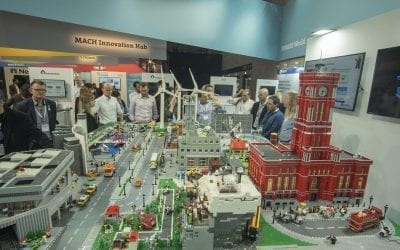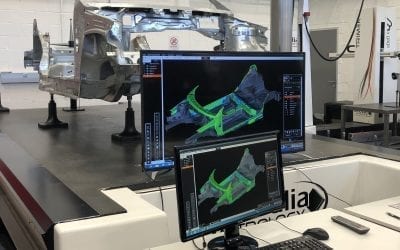This blogpost reviews some news and announces that took place during the last months of 2015 and the start of 2016, around the collaboration framework between NIST, the Global City Teams Challenge and FIWARE.
FIWARE participates in the International Working Group to develop a consensus framework for IoT-enabled Smart City architectures
FIWARE was invited to participate in this initiative due to the great relevance it has in becoming the choice of many cities that are looking for open standards, avoiding locked in concrete vendors. Other international partners supporting the initiative are: ANSI, the American National Standards Institute; ETSI, the European Telecommunications Standards Institute; MSIP, the Republic of Korea’s Ministry of Science, ICT and Future Planning; USGBC, the U.S. Green Building Council; and, ENEA, the Italian National Agency for New Technologies, Energy and Sustainable Economic Development.The U.S. Department of Commerce's National Institute of Standards and Technology (NIST) and several partners have launched a new international technical working group that will develop the common architectural principles for smart cities. In consultation with city stakeholders, the group will make a comparative analysis of existing architectural efforts and produce a framework. This document can then be used to bring greater coherence to standardization activities taking place internationally in various standards developing organizations and consortia.
FIWARE brings the FIWARE NGSI standard API which can work as a pivot point for Interoperability and Portability of smart city applications and services. There are already 89 cities from 19 countries that have taken the step in adopting this standard to export real-time data about what happens in cities. This becomes the fuel for new smart city applications developed by the city or third parties, and a mean for interoperability of vertical smart city solutions. Based on this API, a wide range of other FIWARE Generic Enablers, or alternative enablers, can be integrated to deal with real-time processing, visualization or bigdata analysis of cities’ real-time and historic context information.
The kick-off workshop for the initiative will take place at NIST’s Gaithersburg, Maryland campus, on March 24th-25th, 2016, in conjunction with the NIST Global City Teams Challenge (GCTC) Tech Jam. The initiative expects to draw on the expertise of GCTC project teams that collaborate on city scale applications.
A second workshop will be held, April 14th-15th, 2016 in Rome, Italy, hosted by ENEA. Both workshops will have similar structures with in-depth presentations from experts engaged in activities within the different geographic regions. Interim results will be considered at subsequent workshops in summer 2016. The hope is to produce an initial draft document by September and to finalize it by June of next year.
Participation in the activity is open to anyone. NIST has set up a collaboration website for the project which includes an email list sign-up and a briefing paper providing more information on the project.
Chris Greer, director of NIST’s Smart Grid and Cyber-Physical Systems Program, commented on the fact that, “The growth of the smart cities market is currently hindered by ICT deployments that are customized and not fully interoperable or scalable, as well as by the lack of convergence around architectural design principles and a common language / taxonomy. We want to enable the full spectrum of standards activities to cooperate and harmonize their efforts to enable smart city solutions that meet the needs of modern communities.”
 The official FIWARE partnership with the NIST Global City Teams Challenge 2016 program
The official FIWARE partnership with the NIST Global City Teams Challenge 2016 program
On November 19th 2015, FIWARE was proud to announce that the FIWARE’s participation as a Partner in the National Institute of Standards and Technology’s, NIST, Global City Teams Challenge 2016, GCTC 2016, program was officially confirmed on the 12th November 2015 at the GCTC 2016 Kick-Off Workshop in Gaithersburg, Maryland, USA.
As explained by Jacques Magen, responsible for FIWARE globalization activities (FIWARE Mundus Programme), “FIWARE and GCTC share common objectives in providing cities and their stakeholders with an environment and a program that can help them replicate Smart Cities solutions and services that are efficient and scalable through replicable, standards-based collaborative platforms. This also represents a great opportunity for the FIWARE community to expand its reach internationally and contribute to boost innovation for the development of Smart Cities’ applications and services all over the world”.
“Cities around the world are looking to advanced Internet of Things concepts to make their communities safer, more vibrant, and more livable and workable,” said Chris Greer, Senior Executive for Cyber-Physical Systems at the US National Institute of Standards and Technology. “We can best achieve these goals by working together on interoperable smart city architectures that can serve as the foundation for innovation in cities worldwide and we are pleased to join with FIWARE through our Global City Teams Challenge in an international, cooperative effort.”
As stated by Juanjo Hierro, FIWARE Chief Architect, “FIWARE’s participation in the GCTC 2016 initiative has the main goal of showcasing the benefits coming from the adoption of common "de facto" standard technologies in and for Smart Cities that FIWARE has been developing over the last few years. Global de-facto standards for portability and interoperability will indeed contribute to the creation of a truly sizeable market for smart city services and applications, where developers and solution integrators can invest with a global outlook on sustainable business models.”
FIWARE provides an open source implementation of some of the key standards adopted by the Open and Agile Smart Cities initiative, which currently groups more than 60 cities from 12 different countries.
Jesús Villasante, Head of Unit at the European Commission, declared that “through its participation to GCTC 2016, FIWARE also contributes to build up and strengthen sustainable innovation ecosystems, leveraging on its valuable experience in engaging with relevant players at the European and international level.”
About GCTC 2016
The GCTC 2016 initiative has been launched by the U.S. Department of Commerce's National Institute of Standards and Technology (NIST) and several GCTC 2016 partners are merging forces to bring together on the one side communities facing various smart city challenges and, on the other, innovators with the right set of technologies to tackle and overcome such challenges.
The GCTC Program will bring smart city communities and innovators together to encourage collaboration on a range of issues from disaster response to energy management to mass transit improvement. The goal is to help communities and businesses connect to improve resource management and quality of life by using effective networking of computer systems and physical devices, including Internet of Things (IoT) or cyber-physical systems.
For further information, contact: Sokwoo Rhee (sokwoo.rhee@nist.gov), Associate Director of Cyber-Physical Systems Program
About NIST
As a non-regulatory agency of the U.S. Department of Commerce, NIST promotes U.S. innovation and industrial competitiveness by advancing measurement science, standards and technology in ways that enhance economic security and improve our quality of life. To learn more about NIST, visit www.nist.gov.



